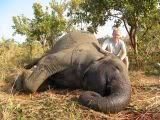

 The Accurate Reloading Forums
The Accurate Reloading Forums  THE ACCURATE RELOADING.COM FORUMS
THE ACCURATE RELOADING.COM FORUMS  Hunting
Hunting  Alaska Hunting Forum
Alaska Hunting Forum  I would like to hear "the rest of the story"...
I would like to hear "the rest of the story"...Go  | New  | Find  | Notify  | Tools  | Reply  |  |
| one of us |
I got an email from the director of Hunter's Safety in Alaska. Got me curious about what he said...can anyone fill me in as I haven't seen the article? He said, "The May issue of Alaska Fish and Wildlife News features one of the weirder incidents in wildlife research in recent years. Biologist Kevin White put a GPS tracking collar on a mountain goat, only to discover a black bear wearing the collar a few months later. Check out the current issue to learn how this happened." _______________________________  | ||
|
| one of us |
http://www.wildlifenews.alaska.gov/ The black bear-mountain goat collar-swap story begins in October, 2006. White and two colleagues captured an older female mountain goat northeast of the Meade Glacier, a tributary of the Juneau Icefield. A month later, following heavy snowfall, the goat moved downslope into forested terrain, and died during the winter. The collar transmitted a mortality signal, but deep snow prevented White from retrieving the collar. Last August, White and colleague Jeff Jemison searched the area where they believed the goat had died, but they were unable to find the collar or the carcass in the heavy brush. This implied that the collar had either malfunctioned or moved beyond the detection range of the radio receiver (three to five miles). Six weeks later White was again in the same general area, and suddenly picked up a signal from the collar. Neither he nor the aircraft pilot, Lynn Bennett, could see anything in the thick alders below. This happened again couple weeks later. White was completely perplexed. Finally, on Oct. 4, he tracked in on the signal on an alpine plateau and saw a black bear wearing a brightly colored collar. He knew there were no Alaska biologists collaring black bears in the area. He figured there were two options – a Canadian researcher collared a bear in the Yukon or British Columbia, and it wandered over to the coast, or the bear had scavenged the carcass of the goat and somehow managed to put on the collar and wear it. The Meade Glacier, in the area where the bear acquired the collar. “When I was considering different scenarios to explain the situation, it seemed inconceivable that this bear could be wearing the missing mountain goat collar,†White said. “For one thing it was a nanny collar; it was small, not much bigger than a collar for a large black-tailed deer.†A week later he was able to positively identify the signal – it was definitely the dead goat’s collar. Each GPS collar has a unique computer IP address, and data retrieved from the bear could only be successfully downloaded from the collar previously worn by the mountain goat. Later, after careful examination of the data, White determined that bear “put on†the collar around July 5, and he’s been able to track the bear’s movements last summer. White said his colleague, bear researcher LaVern Beier, never had any doubt about what was going on. “Kevin was really focused at first on another researcher, but the odds were just too great that someone else would be using that same frequency in the same area,†Beier said. “This was the only logical explanation. But it had to be the right bear with the right size head, and it stayed on.†Beier said that every year or so, Alaskans see pictures in the newspapers of a moose in Anchorage tangled in a swing set, wrapped in a string of Christmas tree lights, or wearing an old tire or something. “Bears are way more mischievous and opportunistic, and they are really curious about foreign objects in their environment,†he said. Beier has watched bears scavenging and said they really root around and get into things, and he can picture a bear slipping its head through the collar. “He didn’t really put on the collar - it’s not like he was trying on clothing,†he said. White downloaded the information from the collar, and was amazed at the bear’s activity. The bear has crossed the Meade Glacier four times, spent time on an isolated nunatak on the ice field – an “island†of rock surrounded by ice, and later returned to the mountains above the Katzehin River. The signal currently indicates the bear is inactive – probably hibernating. An aerial view of the black bear with the goat collar. As of early April, the bear was still hibernating, and White plans another tracking trip in early May. He plans to eventually retrieve the collar. “The collar has a self-release mechanism, it’s scheduled to fall off next fall,†White said. Where the bear decides to go in the meantime is anybody’s guess. Nonetheless, one thing is for certain: studying black bears by collaring mountain goats is unlikely to occur again anytime in the near future. Riley Woodford is a writer with the Alaska Department of Fish and Game. He’s the editor of Alaska Fish and Wildlife News (wildlifenews.alaska.gov) and produces the “Sounds Wild†radio science program. ALLEN W. JOHNSON - DRSS Into my heart on air that kills From yon far country blows: What are those blue remembered hills, What spires, what farms are those? That is the land of lost content, I see it shining plain, The happy highways where I went And cannot come again. A. E. Housman | |||
|
| one of us |
Thanks Allen. How goofy is that? Bears can be very comical at times due to their curiousity. _______________________________  | |||
|
one of us |
Maybe the bear though he wouldnt get shot at with a collar on. -------------------- THANOS WAS RIGHT! | |||
|
| One of Us |
Y'all must not have that many East Texans up there. I am afraid they would look at that collar kinda like shooting a banded Duck. More trophy for the bang. | |||
|
| one of us |
Reminds me of a great story. A hunting buddy of mine (former boss) shot a brownie up on Robert Barron peak. It had a radio collar on it. He put the hide w/collar in his freezer. ADF&G radio tracked the collar to his house!!! He admitted to having taken a radio collared bear. | |||
|
| Powered by Social Strata |
| Please Wait. Your request is being processed... |
|
 The Accurate Reloading Forums
The Accurate Reloading Forums  THE ACCURATE RELOADING.COM FORUMS
THE ACCURATE RELOADING.COM FORUMS  Hunting
Hunting  Alaska Hunting Forum
Alaska Hunting Forum  I would like to hear "the rest of the story"...
I would like to hear "the rest of the story"...

Visit our on-line store for AR Memorabilia

